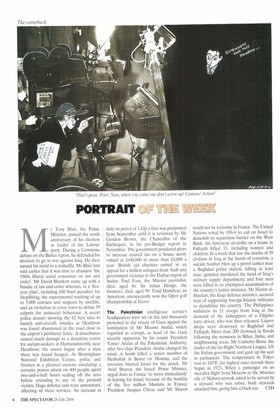M r Tony Blair, the Prime Minister, passed the tenth anniversary
of his election as leader of the Labour party. During a Commons debate on the Butler report, he defended his decision to go to war against Iraq. He then turned his mind to a reshuffle. Mr Blair had said earlier that it was time to abandon 'the 1960s liberal social consensus on law and order'. Mr David Blunkett came up with a bundle of law-and-order wheezes, in a 'fiveyear plan', including £80 fixed penalties for shoplifting, the experimental tracking of up to 5,000 convicts and suspects by satellite, and an invitation to every town to delate 50 culprits for antisocial behaviour. A secret police dossier showing the 62 best sites to launch anti-aircraft missiles at Heathrow was found abandoned in the road close to the airport's perimeter fence. A disturbance caused much damage to a detention centre for asylum-seekers at Harmondsworth, near Heathrow; the unrest began after a man there was found hanged. At Birmingham National Exhibition Centre, police and firemen in a planned exercise simulating a terrorist poison attack on 400 people spent two-and-a-half hours sealing off the area before attending to any of the pretend victims. Huge defence cuts were announced, affecting all three services. An increase in
duty on petrol of 1.42p a litre was postponed from September until it is reviewed by Mr Gordon Brown, the Chancellor of the Exchequer, in his pre-Budget report in November. The government pondered plans to increase council tax on a house newly valued at £440,000 to more than £4,000 a year. British aid charities united in an appeal for a million refugees from Arab and government violence in the Darfur region of Sudan. Paul Foot, the Marxist journalist, died, aged 66. Sir Julian Hodge, the financier, died, aged 99. Todd Hamilton, an American, unexpectedly won the Open golf championship at Troon.
The Palestinian intelligence service's headquarters were set on fire and thousands protested in the streets of Gaza against the nomination of Mr Mousse Arafat, widely regarded as corrupt, as head of the Gaza security apparatus by his cousin President Yasser Arafat of the Palestinian Authority; after two days President Arafat changed his mind. A bomb killed a senior member of Hezbollah in Beirut on Monday, and the terrorists blamed Israel for the attack. Mr Arid l Sharon, the Israeli Prime Minister, urged Jews in France 'to move immediately' in leaving for Israel, because of the hostility of the five million Muslims in France; President Jacques Chirac said Mr Sharon would not be welcome in France. The United Nations voted by 150-6 to call on Israel to demolish its separation barrier on the West Bank. An American air-strike on a house in Fallujah killed 11, including women and children. In a week that saw the deaths of 39 civilians in Iraq at the hands of terrorists, a suicide bomber blew up a petrol tanker near a Baghdad police station, killing at least nine; gunmen murdered the head of Iraq's military supply department; and four men were killed in an attempted assassination of the country's justice minister. Mr Hazim alShaalan, the Iraqi defence minister, accused Iran of supporting foreign Islamic militants to destabilise the country. The Philippines withdrew its 51 troops from Iraq at the demand of the kidnappers of a Filipino lorry driver, who was then released. Liquor shops were destroyed in Baghdad and Fallujah. More than 200 drowned in floods following the monsoon in Bihar, India, and neighbouring areas. Mr Umberto Bossi, the leader of the far-Right Northern League, left the Italian government and gave up his seat in parliament. The temperature in Tokyo rose to 103°F, the highest since records there began in 1923. When a passenger on an Aeroflot flight from Moscow to the Siberian city of Nizhnevartovsk asked to be served by a steward who was sober, both stewards attacked him, giving him a black eye. CSH


























































 Previous page
Previous page